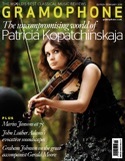Texte paru dans: / Appeared in: |
|
|
Outil de traduction (Très approximatif) |
|
|
Reviewer:
Jonathan Freeman-Attwood
Of the disappointments in the Bach are an ‘Et exsultavit’ delivered with an almost deliberate literalness and an ‘Omnes generationes’ at least twice as slow as any on record – removing any vestige of the energetic meaning of the verse. This occurs again in a puzzlingly supine ‘Sicut locutus’ where Bart Jacobs’s organ continuoplaying, interspersed with colla parte doublings, reduces the movement to a quasi-rehearsal for navigating novice singers. There are some fine instrumental performances which temporarily relieve discomfort, but the skewed concept and unconvincing solo contributions fail to illuminate one of Bach’s richest scores. Turning the page to Handel and suddenly all those widely admired Vox Luminis protagonists, led by Lionel Meunier directing from his bass berth in the ensemble, find their collective purpose and verve. As in their best 17th-century projects, aspiring to a sophisticated exploration of rhetorical potential becomes the standard. From the remarkable concerto opening of ‘Dixit Dominus’, the visceral and the fragile appear beautifully balanced. There’s an intimacy of expression in ‘Tecum principium’ (of a kind not even dimly realised in the Bach), and a chattering urgency in the ‘Tu es sacerdos in aeternum’ on those wonderful words, ‘thou art a priest forever’, as Handel kicks in with timeless roulades rooted finally in a searing pedal cadence.
There’s also a
finely moderated architecture here which entertainingly sees Meunier hotting up
the 22-yearold’s setting in all those places which Handel clearly thought were
jolly good – the moments he revisited in the oratorios a generation later. For
all the misfiring in the Bach, ‘De torrente’ – as unashamedly an erotic product
of Handel’s Roman experience as you’ll find – is simply exquisite: tangy,
ineffable and beautifully controlled. If ever there was a recording to download
one work and jettison the other, this is it. |
|




